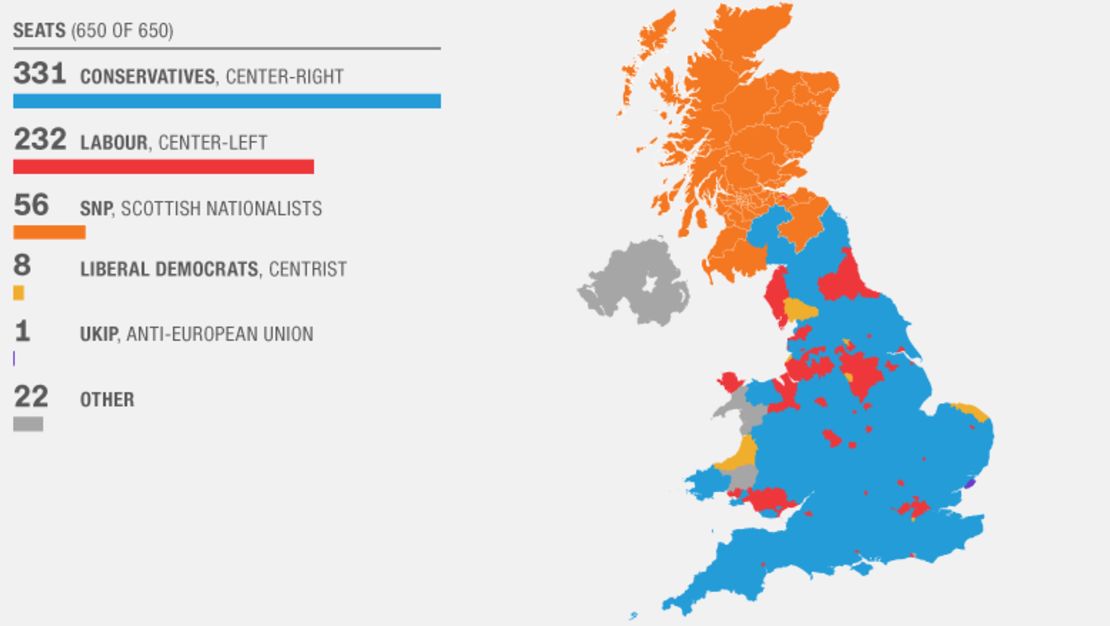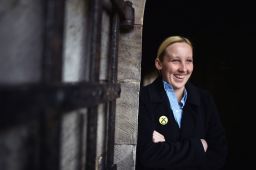Story highlights
Prime Minister David Cameron says Conservatives will form a new government
Cameron: "I truly believe we are on the brink of something special in our country"
Ed Miliband resigns as Labour Party leader, Nick Clegg as Liberal Democrat party chief
Pundits had predicted the UK election would be a close one and suggested there would be days of post-vote, backroom talk to thrash out a power-sharing deal.
Instead, it’s turned into a thumpin’.
With all the results in, British Prime Minister David Cameron and his Conservative Party have claimed an outright majority in Parliament, with 331 seats out of 650, and can form a new government.
As the dust settled Friday, three party leaders resigned, including opposition Labour Party leader Ed Miliband and Liberal Democrat leader Nick Clegg.
What this means for the UK is that the Conservatives get to govern alone after five years in a coalition, though with a slender majority.
Millions in Britain cast their vote, with turnout at about 66%, but the rest of the world should also pay attention.
UK election live blog: Jump aboard CNN’s #bigredbus
The outcome of this election could reshape the country’s global role for years, most importantly in terms of Britain’s relationship with the European Union.
And a strong showing by the Scottish National Party, or SNP, could fuel a fresh push for Scottish independence.
Domestically, the Conservatives have said they’ll push forward with reforms to tackle the huge UK deficit and rein in spending on the welfare state as well as hold a national referendum on continued EU membership by 2017.
Financial markets, primed for days of uncertainty, responded positively to the prospect of a clear outcome.
In a speech outside his Downing Street home, Cameron said he would now form a majority Conservative government that would lead a united nation into a “better future.”
“I truly believe we are on the brink of something special in our country,” he said. “We can make Britain a place where a good life is in reach for everyone who is willing to work and do the right thing.”
He also vowed that the process of devolving greater powers to Scotland, Wales and Northern Ireland would continue as part of a strong union with a long history.
“Together, we can make Great Britain greater still,” Cameron said.
His words came after he met with Queen Elizabeth II at Buckingham Palace – a formal step toward forming a government.
The losers
While the Conservative Party was the clear winner, there were plenty of losers.
Chief among them, Labour – the country’s chief opposition party.
Miliband, who retained his own seat, said he had to take “absolute and total responsibility for the result” and that he was resigning as party leader straight away.
“Britain needs a Labour Party that can rebuild after this defeat so that we can have a government that stands up for working people again,” he said. “And now it’s time for someone else to take forward the leadership of this party.”
He said Labour had been “an incredible force for progress” in recent years – and would be again.
The night’s results were a massive blow to Labour. It didn’t gain seats in the places it badly needed to. And it was blown out of the water in Scotland by the pro-independence SNP, which took 56 out of 59 seats in Scotland – traditionally a Labour stronghold.
Miliband cited a “surge of nationalism in Scotland” as having badly affected the Labour Party.
Perhaps the biggest scalp claimed by the Conservatives at Labour’s expense was that of Ed Balls, the shadow chancellor and a senior Labour Party figure, who lost his seat by just 422 votes.
Another loser was the Liberal Democrat party. It was the junior partner in the previous coalition government with the Conservatives. The Liberal Democrats too had an awful night.
Party leader Clegg, who became deputy prime minister in 2010, held his seat but said he was taking responsibility for the party’s “catastrophic losses” by resigning as party leader.
He had always expected the election to be “exceptionally difficult” for the Liberal Democrats, he said.
“But clearly the results have been immeasurably more crushing and unkind than I could ever have feared.”
The party lost several key figures – chief among them Danny Alexander, chief secretary to the treasury; Vince Cable, the business secretary; and Simon Hughes, former deputy leader of the party and a former London mayoral candidate.
Menzies Campbell, a former leader of the Liberal Democrats, said: “For us we must go back and once again build up from the bottom, from the bottom up which is the only way to do it.”
The UK Independence Party, seen as a threat to the Conservatives, also had a bad night, despite increasing its overall share of the vote.
The party held only one of its two seats and charismatic leader Nigel Farage failed in his own election bid. He announced he was resigning, as he’d previously promised if he didn’t take the seat.
Speaking after the result was announced, Farage said it was time for “real, genuine, radical political change” to the British electoral system to ensure that smaller parties are represented in Parliament.
The winners

Cameron and his party clearly come out on top. Among those holding their seats was Chancellor George Osborne – Britain’s finance minister, who promised to “get straight back to work” on “turning Britain round.” London Mayor Boris Johnson also claimed a place in Parliament for the Conservatives.
Altogether, the party gained more than 20 seats.
In his Downing Street speech, Cameron said the new government would build on its work over the past five years to strengthen the economic recovery. It would help working people by cutting taxes, building new homes and creating jobs, he said.
He also had a kind word for the losers, paying tribute to the hard work of Clegg as his deputy prime minister in the coalition and to Miliband’s commitment to public service.
Meanwhile, White House spokesman Josh Earnest said President Barack Obama “is proud of the strong working relationship that he’s developed with David Cameron over the years and he’s looking forward to continuing to strengthen that personal relationship, but also making sure we continue to deepen the relationship between the American people and the British people.”
French President Francois Hollande and Italian Prime Minister Matteo Renzi also called Cameron to offer their congratulations and invite talks on EU issues, according to his official Twitter account.
5 things we never knew about Cameron
The Scottish push
Another big winner is the SNP.
In one of the biggest shock upsets of the night, 20-year-old politics student Mhairi Black became Britain’s youngest lawmaker since 1667 – ousting one of Labour’s top figures in the process. Her victory for the SNP toppled Douglas Alexander, Labour’s election chief and a former Cabinet minister.

Labour’s Scottish leader, Jim Murphy, lost his parliamentary seat to Kirsten Oswald, another largely unknown challenger, while former British Prime Minister Gordon Brown’s old seat also went to the nationalists.
The SNP’s Alex Salmond, the party’s former leader who pushed for the unsuccessful independence referendum last year, won a seat at Westminster.
Salmond said the result was clear. “We’re seeing an electoral tsunami on a gigantic scale,” he told CNN’s UK affiliate ITN, “and that is a tide flowing with the Scottish National Party.”
A big win for the party could accelerate the resurgent momentum toward another Scottish independence referendum in the years to come.
But gaining independence for Scotland isn’t the only issue on the party’s agenda. It also wants to end Britain’s nuclear weapons program, which could have an impact on the country’s relationship with NATO.
Nicola Sturgeon, its current leader and the winner of much acclaim during the campaign, said her party’s members of Parliament had promised they “would be elected to make Scotland’s voice heard and that’s exactly what we intend to do.”
But she said they would also seek “to work with others across the UK, to try to get more progressive politics at the heart of Westminster.”
The ‘repeat rebels’
While Cameron won’t need a coalition partner this time around, governing with such a slender majority won’t be easy.
“Although people will portray this as a great Conservative victory – and against the expectations it is – Cameron’s problems now are only just beginning because, if he’s only got a very small majority, he’s going to be in hock to the extreme right wing of his party,” said professor Robert Hazell of University College London. This right wing includes 10 to 20 “repeat rebels,” Hazell said, who could cause Cameron major headaches.
For the moment, though, Cameron can heave a big sigh of relief and savor the sweet taste of victory over Labour.
United Kingdom votes
CNN’s Laura Smith-Spark reported and wrote from London; Paul Armstrong from Hong Kong. Catherine E. Shoichet, Nic Robertson, Stephen Collinson, Tom Foreman, John Vause, Fred Pleitgen, Richard Allen Greene, Christiane Amanpour, Antonia Mortensen, Andrew Carey, Alexander Felton and Rachel Clarke contributed to this report.





































































